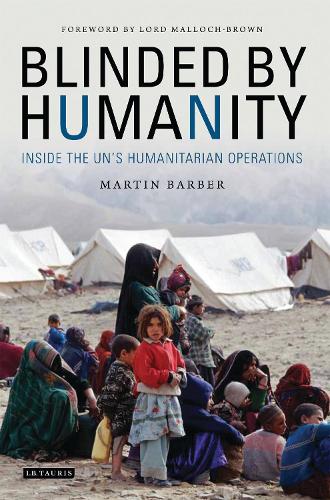
Blinded by Humanity: Inside the UN's Humanitarian Operations
(Paperback)
Publishing Details
Blinded by Humanity: Inside the UN's Humanitarian Operations
By (Author) Martin Barber
Foreword by Lord Malloch-Brown
Bloomsbury Publishing PLC
I.B. Tauris
30th April 2016
United Kingdom
Classifications
General
Non Fiction
Peacekeeping operations
341.584
Physical Properties
Paperback
264
Width 138mm, Height 216mm
390g
Description
How to respond effectively to humanitarian crises is one of the most pressing and seemingly intractable problems facing the United Nations. Martin Barber, for many years a senior UN official and with decades of humanitarian experience, here argues that the explanation for UN 'failures' or only partial successes lies not with any lack of idealism or good intentions but with the constraints placed on aid workers by ill-considered policies and poor practical application - officials are 'blinded by humanity'.Barber presents an inside story based on personal/hands-on/practical experience in Laos, Thailand, Afghanistan, Bosnia-Herzegovina and, finally, in Abu Dhabi where he advised the UAE government on its aid programme. He tells of internal struggles at head office and the challenges of working in the field. All the major UN activities - and headaches - are here, including refugee work, coordinating humanitarian aid, peacekeeping, the huge problem of 'de-mining', and the complex internal workings of the UN Secretariat.A personal narrative and lessons drawn from direct experience provide the frame for an examination of major questions concerning the future of humanitarian response - how effectively have international institutions discharged their responsibilities towards people affected by conflict
Specifically, how did the UN perform And how might the UN better help such people in the 21st century Barber analyses recent policy developments intended to improve the quality and effectiveness of the UN's work in humanitarian fields, and assesses the extent to which recent reforms are likely to make the UN a more effective partner for countries emerging from conflict. In the final chapter he highlights seven 'blind spots' whose significance has been consistently ignored or overlooked, and in each case suggests a radical new approach.
Reviews
Read the book and get wiser. It is full of interesting and useful infor for all who care about international humanitarian issues. It deserves a wide readership. -- Hanne Christensen & Poul Brandrup * International Journal of Peace and Conflict Studies *
Author Bio
List of illustrationsForeword by Lord Malloch-BrownPreface AcknowledgementsIntroduction 1. Starting out - in Laos2. Across the Mekong - with Indo-Chinese refugees in Thailand3. Refugees, asylum-seekers and IDPs - the view from Europe in the 1980s4. Afghanistan - The missed opportunities5. Crisis in Europe's Backyard - Coordinating international efforts in Bosnia and Herzegovina6. A Secretary General from the United Nations - Kofi Annan's impact on how the UN deals with crises7. Landmines - The hidden mutilators8. Aid from Arabia - Lessons for the West9. Pulling it all together - Coordination of international response to crisis10. Blinded by humanityAppendix - "How can I get a job with the United Nations"Suggested further readingAcronymsGlossaryIndex
